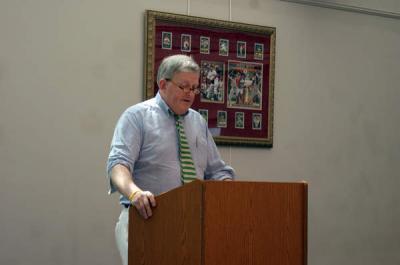The lore and legends of the Red Sox organization
The most memorable Red Sox moments - both triumphant and cringe-inducing - occur undoubtedly on the field, but we all know that the Red Sox are much more than a team a team of baseball players.
In a talk at the library Saturday morning, Richard Johnson, sportswriter and curator of the New England Sports Museum, demonstrated that the story of the back office, however, deserves at least equal billing in creating today's Red Sox Nation.
It's difficult for a fan - and Johnson is certainly a fan - to cover Red Sox lore without invoking the angst and melodrama in which we all seem to revel and to discuss the less noble aspects of Red Sox history. However, Johnson was pretty even-handed, and revealed some interesting perspective that you may not hear if a regular listener on WEEI.
He called it "The Blessing of the Babe," by focusing on the pitching that Ruth offered the Red Sox before the trade as well as the revenue that he brought to Fenway Park.
"The Yankees were America's team," he said, explaining that the Yankees popularity had as much to do with the Ruth phenomenon as Ruth himself. "They weren't the evil empire, they were a meal ticket," as 50 percent of home attendance in Fenway Park during Red Sox - Yankees games could be attributed to people coming to see Ruth.
"He was the best pitcher and the best player all together," he said. "Imagine if Albert Pujols played the way he does, then decided to pitch and won 20 games."
Johnson also revealed interesting facts about Tom Yawkey. Despite a reputation as a Boston civic hero, Yawkey never owned property in Boston other than Fenway Park. Furthermore, his treatment of players like family, while winning him accolades among his ballplayers, also made him to hesitant to discipline his players and staff, leading to plenty of ‘if onlys.'
And the ‘if onlys' provide sustenance for the Red Sox fan, so no talk on the lore of the Red Sox could be forget those. And Johnson delivered.
Foremost in his mind was the leeway that Yawkey gave Pinky Higgins and Terry Woodall, a period he refers to as the "Crony Island era." Higgins was an avowed racist who wouldn't sign Jackie Robinson. Terry Woodall filed a false scouting report after getting sick of waiting for a three-day rainstorm to clear. The scouting report focused on a member of the Negro League team affiliated with the Red Sox (whose players the Red Sox had rights of first refusal to sign) named Willie Mays. The report said he was nothing special.
"A right-handed power hitter in Fenway," Johnson mused aloud. He then told the crowd that after his retirement, Mays said he had been looking forward to batting in the same lineup as Ted Williams.
But we all know the happy ending.
"We're finally getting what we deserve as fans," said Johnson, simply.















